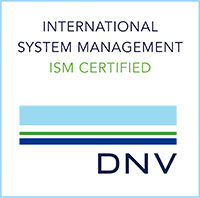

Tuesday 28th October 2014, Cowes – Class-leading offshore energy support vessel operator Seacat Services today unveils Seacat Intrepid, the first DNV GL certified 26m-crew transfer vessel to profit from a unique workboat tank testing programme.
With preliminary sea trials now complete, the official unveiling of Seacat Intrepid marks a turning point in the evolution of workboat craftsmanship and design.
Seacat Intrepid is the first British-built workboat to benefit from a three-year offshore wind farm workboat research and development programme that capitalises on an improved understanding of wind, wave and weather conditions within European waters. This, combined with service and design refinements that have been introduced following continual feedback from clients and crew, make this 26-metre class-leading workboat a benchmark for future European workboat builds.
As the demands of servicing offshore wind farm developments increase, it’s essential that workboats and their crews adapt to longer operational hours at sea.
It’s because of this, for example, that Seacat Intrepid now boasts a fuel capacity of 26,000 litres and a wider foredeck – thereby increasing the number of operational hours served between fuel stops and enabling the accommodation of 20-foot equipment containers. Both of these areas have been consistently cited as elements within the workboat industry that have needed focus and improvement.
Further enhancements that have also been made as a direct result of the three-year research and development tank-testing programme have included an increase in raft height from the wet deck to the sea, reducing wave impacts, decreasing internal noise levels within the cabin and providing a smoother ride.
Further cabin refinements have also been made within the interior of the vessel to make use of additional space and increase functionality and comfort for service technicians and crews while working far out at sea.
“Seacat Intrepid is the very first workboat to benefit from this unique, three-year research and development tank-testing programme,” said Ian Baylis, Managing Director Seacat Services.
“And, while a huge amount of work has been undertaken behind the scenes to bring this 26-metre class certified workboat to the water, the benefits to the service technicians that will be spending time at sea with her are clear. Seacat Intrepid is arguably the most advanced and capable offshore energy support vessel available to charter. The changes are significant but the familiarity – both in terms of service and facilities onboard – makes her instantly recognisable to our clients and crews.”
Baylis added, “This first 26-metre workboat is another important step forwards for Seacat Services – and with our second 26-metre vessel already in build, it marks an important moment in the evolution, development and history of European offshore energy workboats.”
Before heading directly onto winter charter, Seacat Intrepid will be officially inaugurated by Chris Brammall, Economic Development Project Officer at the Isle of Wight Council, later today. Chris is the project lead for the Solent Offshore Renewable Energy Council, (SOREC), which supports regional commercial activity and growth.
Chris Brammall said, “The Isle of Wight Council recognises that offshore renewable energy is vital in the development of a healthy economy on the Isle of Wight.
“Today we see two fine examples of what island companies can achieve within this industry. South Boats IOW rightly have an international reputation for the manufacture of work boats to service offshore wind farms, while Seacat Services have acquired a reputation that is second to none for the supply of crewed vessels to the sector. Both companies have worked with SOREC and demonstrate the strength here on the Island of the supply chain to the offshore renewable energy industry. ”
Seacat Intrepid departs the Isle of Wight tomorrow for her first winter charter, joining two sister workboats to work with an important European wind farm developer and operator.

